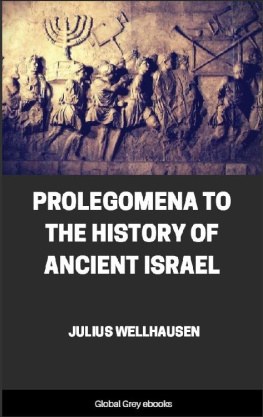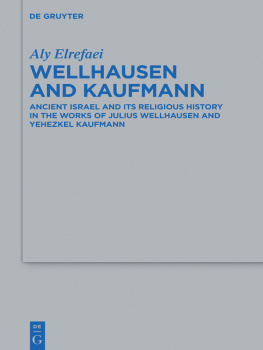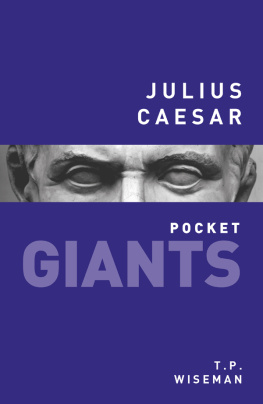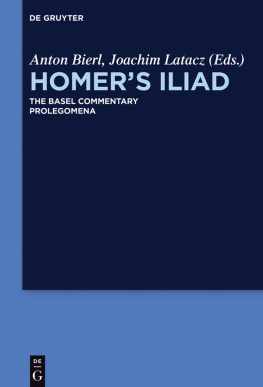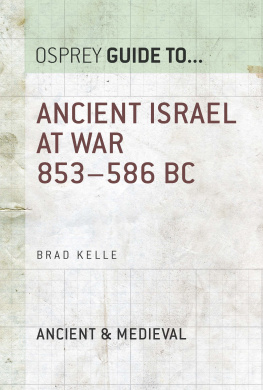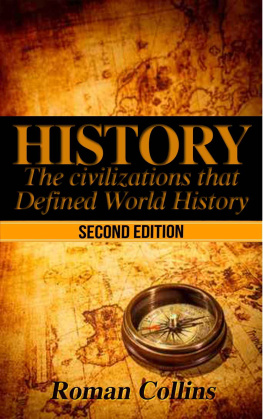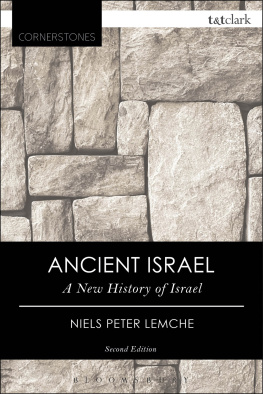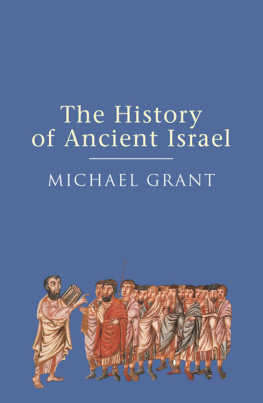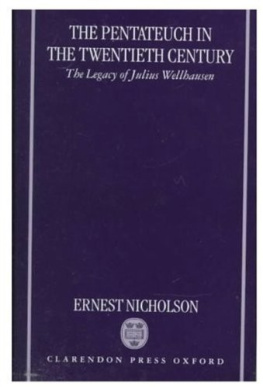Julius Wellhausen - Prolegomena to the History of Ancient Israel
Here you can read online Julius Wellhausen - Prolegomena to the History of Ancient Israel full text of the book (entire story) in english for free. Download pdf and epub, get meaning, cover and reviews about this ebook. year: 2018, publisher: Global Grey ebooks, genre: Religion. Description of the work, (preface) as well as reviews are available. Best literature library LitArk.com created for fans of good reading and offers a wide selection of genres:
Romance novel
Science fiction
Adventure
Detective
Science
History
Home and family
Prose
Art
Politics
Computer
Non-fiction
Religion
Business
Children
Humor
Choose a favorite category and find really read worthwhile books. Enjoy immersion in the world of imagination, feel the emotions of the characters or learn something new for yourself, make an fascinating discovery.
- Book:Prolegomena to the History of Ancient Israel
- Author:
- Publisher:Global Grey ebooks
- Genre:
- Year:2018
- Rating:4 / 5
- Favourites:Add to favourites
- Your mark:
- 80
- 1
- 2
- 3
- 4
- 5
Prolegomena to the History of Ancient Israel: summary, description and annotation
We offer to read an annotation, description, summary or preface (depends on what the author of the book "Prolegomena to the History of Ancient Israel" wrote himself). If you haven't found the necessary information about the book — write in the comments, we will try to find it.
Prolegomena to the History of Ancient Israel — read online for free the complete book (whole text) full work
Below is the text of the book, divided by pages. System saving the place of the last page read, allows you to conveniently read the book "Prolegomena to the History of Ancient Israel" online for free, without having to search again every time where you left off. Put a bookmark, and you can go to the page where you finished reading at any time.
Font size:
Interval:
Bookmark:
PROLEGOMENA TO THE HISTORY OF ANCIENT ISRAEL
BY
JULIUS WELLHAUSEN
WITH A REPRINT OF THE ARTICLE "ISRAEL"
FROM THE "ENCYCLOPAEDIA BRITANNICA."
TRANSLATED FROM THE GERMAN, UNDER THE AUTHOR'S SUPERVISION,
by
J. SUTHERLAND BLACK, M.A.,
and
ALLAN MENZIES, B.D.
with a preface by
PROF. W. ROBERTSON SMITH.
1885
Prolegomena to the History of Ancient Israel by Julius Wellhausen.
This edition was created and published by Global Grey
GlobalGrey 2018

globalgreyebooks.com
The work which forms the greater part of the present volume first appeared in 1878 under the title History of Israel. By J. Wellhausen. In two volumes. Volume I. The book produced a great impression throughout Europe, and its main thesis, that "the Mosaic history is not the starting-point for the history of ancient Israel, but for the history of Judaism," was felt to be so powerfully maintained that many of the leading Hebrew teachers of Germany who had till then stood aloof from the so-called "Grafian hypothesis"the doctrine, that is, that the Levitical Law and connected parts of the Pentateuch were not written till after the fall of the kingdom of Judah, and that the Pentateuch in its present compass was not publicly accepted as authoritative till the reformation of Ezradeclared themselves convinced by Wellhausen's arguments. Before 1878 the Grafian hypothesis was neglected or treated as a paradox in most German universities, although some individual scholars of great name were known to have reached by independent inquiry similar views to those for which Graf was the recognised sponsor, and although in Holland the writings of Professor Kuenen, who has been aptly termed Graf's goel, had shown in an admirable and conclusive manner that the objections usually taken to Graf's arguments did not touch the substance of the thesis for which he contended.
Since 1878, partly through the growing influence of Kuenen, but mainly through the impression produced by Wellhausen's book, all this has been changed. Almost every younger scholar of mark is on the side of Vatke and Reuss, Lagarde and Graf, Kuenen and Wellhausen, and the renewed interest in Old Testament study which is making itself felt throughout all the schools of Europe must be traced almost entirely to the stimulus derived from a new view of the history of the Law which sets all Old Testament problems in a new light.
Our author, who since 1878 had been largely engaged in the study of other parts of Semitic antiquity, has not yet given to the world his promised second volume. But the first volume was a complete book in itself; the plan was to reserve the whole narrative of the history of Israel for vol. ii., so that vol. i. was entirely occupied in laying the critical foundations on which alone a real history of the Hebrew nation could be built. Accordingly, the second edition of the History, vol. i., appeared in 1883 (Berlin, Reimer), under the new title of Prolegomena to the History of Israel. In this form it is professedly, as it really was before, a complete and self-contained work; and this is the form of which a translation, carefully revised by the author, is now offered to the public.
All English readers interested in the Old Testament will certainly be grateful to the translators and publishers for a volume which in its German garb has already produced so profound an impression on the scholarship of Europe; and even in this country the author's name is too well known to make it necessary to introduce him at length to a new public. But the title of the book has a somewhat unfamiliar sound to English ears, and may be apt to suggest a series of dry and learned dissertations meant only for Hebrew scholars. It is worth while therefore to point out in a few words that this would be quite a false impression; that the matters with which Professor Wellhausen deals are such as no intelligent student of the Old Testament can afford to neglect; and that the present volume gives the English reader, for the first time, an opportunity to form his own judgment on questions which are within the scope of any one who reads the English Bible carefully and is able to think clearly, and without prejudice, about its contents. The history of Israel is part of the history of the faith by which we live, the New Testament cannot be rightly understood without understanding the Old, and the main reason why so many parts of the Old Testament are practically a sealed book even to thoughtful people is simply that they have not the historical key to the interpretation of that wonderful literature.
The Old Testament does not furnish a history of Israel, though it supplies the materials from which such a history can be constructed. For example, the narrative of Kings gives but the merest outline of the events that preceded the fall of Samaria; to understand the inner history of the time we must fill up this outline with the aid of the prophets Amos and Hosea. But the more the Old Testament has been studied, the more plain has it become that for many parts of the history something more is needed than merely to read each part of the narrative books in connection with the other books that illustrate the same period. The Historical Books and the Pentateuch are themselves very composite structures, in which old narratives occur imbedded in later compilations, and groups of old laws are overlaid by ordinances of comparatively recent date. Now, to take one point only, but that the most important, it must plainly make a vast difference to our whole view of the providential course of Israel's history if it appear that instead of the whole Pentateuchal law having been given to Israel before the tribes crossed the Jordan, that law really grew up little by little from its Mosaic germ, and did not attain its present form till the Israelites were the captives or the subjects of a foreign power. This is what the new school of Pentateuch criticism undertakes to prove, and it does so in a way that should interest every one. For in the course of the argument it appears that the plain natural sense of the old history has constantly been distorted by the false presuppositions with which we have been accustomed to approach itthat having a false idea of the legal and religious culture of the Hebrews when they first entered Canaan, we continually miss the point of the most interesting parts of the subsequent story, and above all fail to understand the great work accomplished by the prophets in destroying Old Israel and preparing the way first for Judaism and then for the Gospel. These surely are inquiries which no conscientious student of the Bible can afford to ignore.
The process of disentangling the twisted skein of tradition is necessarily a very delicate and complicated one, and involves certain operations for which special scholarship is indispensable. Historical criticism is a comparatively modern science, and in its application to this, as to other histories, it has made many false and uncertain steps. But in this, as in other sciences, when the truth has been reached it can generally be presented in a comparatively simple form, and the main positions can be justified even to the general reader by methods much less complicated, and much more lucid, than those originally followed by the investigators themselves. The modern view as to the age of the Pentateuchal law, which is the key to the right understanding of the History of Israel, has been reached by a mass of investigations and discussions of which no satisfactory general account has ever been laid before the English reader. Indeed, even on the Continent, where the subject has been much more studied than among us, Professor Wellhausen's book was the first complete and sustained argument which took up the question in all its historical bearings.
Next pageFont size:
Interval:
Bookmark:
Similar books «Prolegomena to the History of Ancient Israel»
Look at similar books to Prolegomena to the History of Ancient Israel. We have selected literature similar in name and meaning in the hope of providing readers with more options to find new, interesting, not yet read works.
Discussion, reviews of the book Prolegomena to the History of Ancient Israel and just readers' own opinions. Leave your comments, write what you think about the work, its meaning or the main characters. Specify what exactly you liked and what you didn't like, and why you think so.

